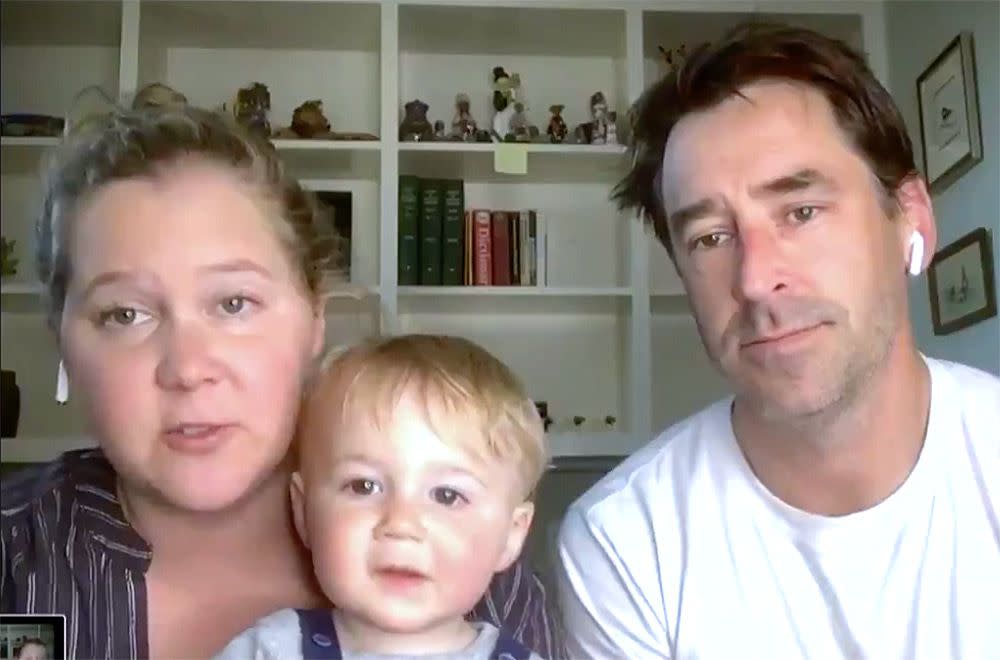Amy Schumer's 3-Year-Old Son Was Hospitalized with RSV — Here's What to Know About the Illness

- Oops!Something went wrong.Please try again later.
- Oops!Something went wrong.Please try again later.
Amy Schumer, Chris Fischer, and their son
Amy Schumer's son Gene is on the mend after a bout with respiratory syncytial virus, more commonly known as RSV.
In an Instagram post on Sunday, the comedian and actress, 41, revealed that her son with husband Chris Fischer was hospitalized for RSV as she was juggling the demanding schedule of hosting Saturday Night Live this week.
"This was the hardest week of my life," Schumer wrote alongside a series of behind-the-scenes photographs on the SNL set. "I missed Thursday rehearsals when my son was rushed to the ER and admitted for RSV. Shout out to all the parents going through this right now."
Thankfully, Schumer added that Gene, 3, is now "home and better."
RELATED: Amy Schumer Reveals Her Son Gene, 3, Was Hospitalized for RSV: 'Hardest Week of My Life'
Schumer's family is one of many dealing with the illness, as Respiratory Syncytial Virus (RSV) cases are surging across the United States.
The virus, which causes mild, cold-like symptoms among adults and older children, can result in severe complications in babies younger than 12 months as it spreads to the lower respiratory tract, causing pneumonia (infection of the lung) and bronchiolitis (inflammation of the lung).
Spread through coughing and sneezing, RSV usually peaks in late winter, but it's striking earlier this year and causing a shortage of pediatric hospital beds.
"Because of pandemic precautions like masking and social distancing, kids who are infants, or 2 or 3 years old, probably haven't been exposed to RSV, like their older brothers and sisters were during previous years. So there's an "immunity gap" and more children now are getting more sick from this germ," Dr. Elizabeth Murray, a pediatrician specializing in Pediatric Emergency Medicine and Child Health Advocacy and a member of PEOPLE's Health Squad previously told PEOPLE.
The CDC advises parents and doctors to keep an eye out for cases of RSV, particularly in young children, adults over age 65 or those with chronic illnesses.
RSV will cause mild, cold-like symptoms, and parents should look for runny nose, a decrease in appetite and a worsening cough, according to the CDC. Infants under 6 months old will almost always show symptoms or irritability, decreased activity and appetite and apnea, or pauses in breathing. Fever may or may not be present.
RELATED: RSV Illness Surge Fills More Than 70% of U.S. Pediatric Hospital Beds
The signs of RSV are not subtle, Murray emphasized. Parents should be concerned "if a child is really having difficulty breathing, meaning that you can see their muscles really sucking in around their rib cage or, for a baby, their nose starts to flare or they kind of grunt with every breath," she explained. "Babies often have difficulty bottle feeding or breastfeeding because they're so congested. They can't breathe and suck and swallow at the same time, so they really start to struggle."
While you can't prevent RSV — a vaccine is currently in development — you can lower your family's risk by practicing good hygiene such as hand washing, covering coughs and sneezes and using tissues.
Most importantly, said Murray: "If you or your child is sick, you need to stay home."

